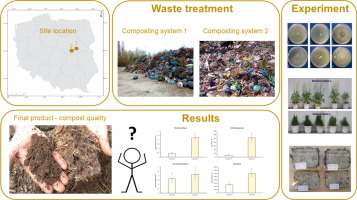Waste Management ( IF 7.1 ) Pub Date : 2020-03-26 , DOI: 10.1016/j.wasman.2020.03.030 Magdalena Daria Vaverková , Jakub Elbl , Stanislava Voběrková , Eugeniusz Koda , Dana Adamcová , Zygmunt Mariusz Gusiatin , Abd Al Rahman , Maja Radziemska , Zbigniew Mazur

|
One of crucial waste management problems is the management of organic waste. This activity employs the composting. In case of green waste, its application seems reasonable, whereas the use of selected mixed waste raises problems related to the compost quality. Across countries, the non-sterile organic fraction of municipal solid waste is being separated through the mechanical-biological treatment. The technology is a solution of waste treatment and meets objectives set out in the Landfill Directive. There are many problems associated with the use of output products. The use of compost as a fertilizer requires determination of its impact on the environment. Compost quality can be assessed using analytical methods and phytotoxicity tests. Therefore, the aim of this study was to describe changes in physico-chemical, enzymatic, phytotoxicity and vegetation parameters occurring in composts from two systems - a prismatic installation for green waste, and a mechanical-biological treatment installation. The compost from green waste exhibited greater stability. Values of dehydrogenase activity were lower if compared with the mechanically and biologically treated compost, which indicates lower compost maturity. The biomass production of Brassica napus L. and Fetuca rubra L. was higher in the variant with the application of green compost. The influence on Hordeum vulgare L., Cannabis sativa L., and Sinapis alba L. depended on the plant type and the compost used. Nevertheless, the compost from green waste was less toxic. The evidence from this study suggests that the mechanical-biological treatment had problems associated with the maturation and quality of the final product.
中文翻译:

堆肥与机械生物处理:确实会改变最终产品的参数和成熟度
废物管理的关键问题之一是有机废物的管理。该活动使用堆肥。对于绿色废物,其应用似乎是合理的,而选择混合废物的使用会带来与堆肥质量有关的问题。在世界各地,城市固体废物的非无菌有机部分都通过机械生物处理进行分离。该技术是废物处理的一种解决方案,可满足垃圾填埋场指令中规定的目标。使用输出产品存在许多问题。使用堆肥作为肥料需要确定其对环境的影响。堆肥质量可以使用分析方法和植物毒性测试进行评估。因此,本研究的目的是描述理化,酶促,两种系统的堆肥中都存在植物毒性和植被参数-用于绿色废物的棱柱形装置和机械生物处理装置。来自绿色废物的堆肥表现出更高的稳定性。与机械和生物处理堆肥相比,脱氢酶活性的值较低,这表明堆肥的成熟度较低。的生物量生产在使用绿色堆肥的情况下,甘蓝型油菜和红景天油菜的含量更高。对大麦(Hordeum vulgare L.),大麻(Cannabis sativa L.)和白菜(Sinapiis alba L.)的影响取决于所使用的植物类型和堆肥。但是,绿色废物产生的堆肥毒性较小。这项研究的证据表明,机械生物学处理存在与最终产品的成熟度和质量相关的问题。











































 京公网安备 11010802027423号
京公网安备 11010802027423号